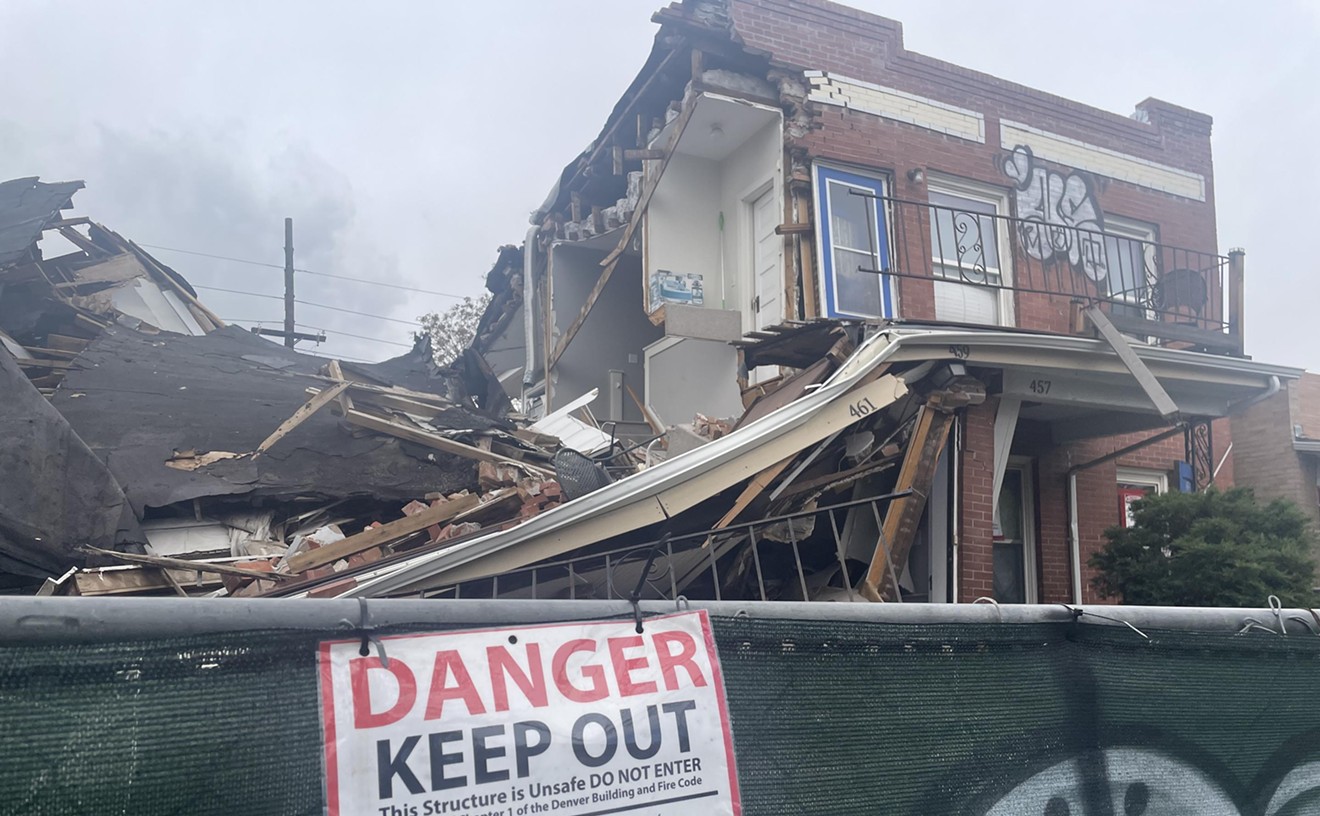Although Colorado has joined a lawsuit intended to stop the repeal of Deferred Action for Childhood Arrivals, better known as DACA, President Donald Trump's plan to end the program on March 5, 2018, remains in place at this writing, with today, October 5, standing as the deadline for submitting renewal applications; get more details below. That leaves DACA students who were brought to this country as children in limbo and potentially vulnerable to deportation for even otherwise insignificant offenses. And according to an advocate for restorative practices, a process being used in Denver Public Schools, such risks can also extend to DACA students' loved ones.
"If a brown youth is brought through the criminal-justice system for a minor violation in their school building, we could see them and their family being flagged for deportation," says Allison Meier, project manager for Denver School-Based Restorative Practices Partnership, a coalition that includes Padres & Jóvenes Unidos, the Advancement Project, the Denver Classroom Teachers Association and Denver Public Schools. She adds that "the stakes are so much higher now than they were before."
The restorative-practices approach to dealing with conflicts isn't new to DPS. Meier points out that "Denver Public Schools began implementing it in 2006, using a grant from the Colorado Department of Education that was specifically working with expelled and at-risk students. It started with just four schools, but the following year, four more were added. And in 2008, with pressure from the community, and specifically Padres & Jóvenes Unidos, the school district reformed its discipline policy — and restorative practices are actually the only named intervention."
At present, there are 100 restorative-practices coordinators at the 200 or so schools in DPS, and even institutions without dedicated staff use the program. As outlined in the DSRPP implementation guidelines, accessible below, personnel are encouraged to use peer-led mediation, conferencing, dialogue and more to resolve conflicts, as opposed to immediately getting law enforcement involved.
Meier uses a story to describe why this last element of restorative practices is so important.
"I can remember a student who was caught doing graffiti on a bathroom stall," she says. "It would have been just as effective, if not more effective, to use restorative practices — like having the student work with the janitorial staff to clean up the stall. That way, the student would really understand the impact of his behavior on the school. But instead, he was ticketed, and he didn't really understand the court process. He didn't realize he'd have to go to a court date for it, didn't realize this was something real beyond the school building. Then, when he was 21 years old, he was pulled over for a broken taillight and found out there were a bunch of warrants out for his arrest over this graffiti incident when he was sixteen or seventeen. And he was brought to jail."
This particular student wasn't in DACA. But if he had been, Meier points out, Immigration and Customs Enforcement (ICE) agents might have stripped him of his right to stay in the U.S. legally — and if his parents and family members were undocumented, the same thing could've happened to them.
Getting into a schoolyard scuffle carries the same kind of risk for a DACA student.
"Any high school in Denver has a school resource officer, a police officer on site," Meier notes. "Now these officers are asked to stop ticketing any students who are in a fight. Fights were pretty rare, and that was their protocol: Anyone who was in a fight typically was ticketed. But ticketing students meant that they'd end up on a list that would impact their immigration status."
Of course, restorative practices aren't only for DACA students, as Maria Rosales understands. Currently a senior at North High School, Rosales is fully documented — but she's benefited from the program, too.
"When I was in ninth or tenth grade, I was getting into trouble a lot," Rosales says. "I was really mean, and I started conflicts with students — and since I went to a non-tolerant school, I wasn't used to having a conversation with the student I was in conflict with until I came to North."
Upon first learning about restorative practices, "I didn't really want to do it, because it was something new to me," Rosales concedes. "I wasn't familiar with the way it was done. But once I did it more than three times, I realized it was something that was going to help me. I started practicing it outside of school, and it's even helped me in my relationship with my mom. I remember having conflicts with her but never really having communication with her. But after using restorative practices, my mom and I have a lot better communication. It's a good resource."
Restorative practices offer the prospect of larger societal benefits as well, Meier believes. "Students get ticketed inside of school buildings for what we would consider typical adolescent behavior, and all of a sudden, something that could be used as a learning opportunity is instead turned into a crime. That's why we see students graduating with police records. It's a very explicit school-to-prison pipeline."
In the meantime, the folks at Padres & Jóvenes Unidos "have also been using the phrase 'school-to-deportation pipeline,'" Meier adds. "And that's something restorative practices can help stop."
Click to access the Denver School-Based Restorative Practices Partnership Implementation Guide and continue for information about today's DACA renewal deadline courtesy of U.S. Citizenship and Immigration Services, complete with links from the original document.
Deadline to Submit DACA Renewal Requests Approaching On Oct. 5
U.S. Citizenship and Immigration Services (USCIS) is reminding eligible Deferred Action for Childhood Arrivals (DACA) recipients that they have one week to properly file their DACA renewal requests and associated applications for employment authorization. As previously announced, for recipients whose DACA and work authorization expire between Sept. 5, 2017, and March 5, 2018, inclusive, USCIS will continue to accept renewal requests through Oct. 5, 2017. These requests must be properly filed and physically received by the agency at the proper filing location no later than Oct. 5. The mailing address and instructions can be found here. Renewal requests that are granted will be valid for two years, unless otherwise terminated or revoked.
Individuals with DACA and associated work authorization that expire after March 5, 2018, are no longer eligible to submit a renewal request. However, their current DACA and work authorization will remain valid until they expire, unless otherwise terminated or revoked.
Individuals with DACA and associated work authorizations that expired on or before Sept. 4, 2017, who had not properly filed a renewal request that was received on or before Sept. 5, 2017, are also no longer eligible to request renewal.
Based on legal guidance issued by the Attorney General, Acting Secretary of Homeland Security Elaine Duke issued a memorandum on Sept. 5, 2017, initiating an orderly wind-down of DACA. Additional information on this topic can be found on the USCIS website.
For more information on USCIS and its programs, please visit uscis.gov or follow us on Twitter (@uscis), YouTube (/ucis), Instagram (@uscis) and Facebook (/uscis).
[
{
"name": "Air - MediumRectangle - Inline Content - Mobile Display Size",
"component": "12017618",
"insertPoint": "2",
"requiredCountToDisplay": "2"
},{
"name": "Editor Picks",
"component": "17242653",
"insertPoint": "4",
"requiredCountToDisplay": "1"
},{
"name": "Inline Links",
"component": "18838239",
"insertPoint": "8th",
"startingPoint": 8,
"requiredCountToDisplay": "7",
"maxInsertions": 25
},{
"name": "Air - MediumRectangle - Combo - Inline Content",
"component": "17261320",
"insertPoint": "8th",
"startingPoint": 8,
"requiredCountToDisplay": "7",
"maxInsertions": 25
},{
"name": "Inline Links",
"component": "18838239",
"insertPoint": "8th",
"startingPoint": 12,
"requiredCountToDisplay": "11",
"maxInsertions": 25
},{
"name": "Air - Leaderboard Tower - Combo - Inline Content",
"component": "17261321",
"insertPoint": "8th",
"startingPoint": 12,
"requiredCountToDisplay": "11",
"maxInsertions": 25
}
]














